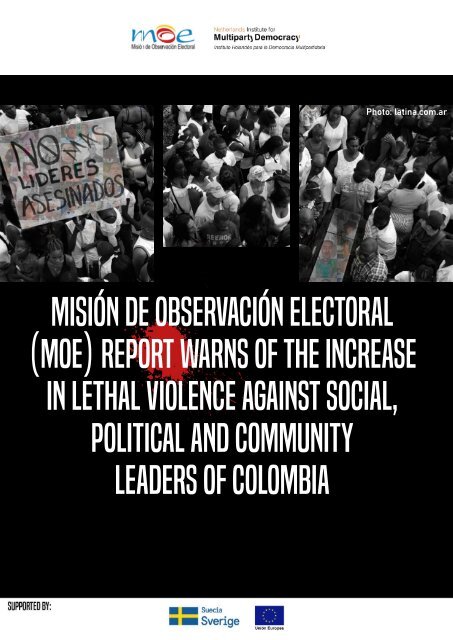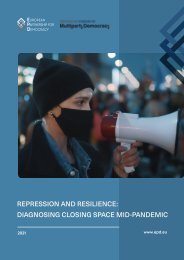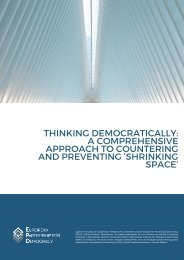Main findings: Political violence against Colombian leaders
Create successful ePaper yourself
Turn your PDF publications into a flip-book with our unique Google optimized e-Paper software.
Photo: latina.com.ar<br />
MISIÓN DE OBSERVACIÓN ELECTORAL<br />
(MOE) REPORT WARNS OF THE INCREASE<br />
IN LETHAL VIOLENCE AGAINST SOCIAL,<br />
POLITICAL AND community<br />
LEADERS OF COLOMBIA
COLOMBIA,<br />
A COUNTRY TORMENTED BY VIOLENCE<br />
REPORT ON VIOLENCE AGAINST<br />
POLITICAL, SOCIAL<br />
AND COMMUNAL LEADERS<br />
Photo:<br />
Fundación, paz y reconciliación<br />
A great part of Colombia’s history has been<br />
immersed in an internal armed conflict,<br />
where its recent protagonists have been<br />
guerrilla and paramilitary groups financed<br />
by drug trafficking money and in combat with<br />
state forces. Since 1990, more than 6 peace<br />
agreements have been signed with armed<br />
groups of different ideological tendencies.<br />
The most recent agreement was signed in<br />
November 2016 between President Juan<br />
Manuel Santos and the oldest guerrilla of the<br />
continent, the Revolutionary Armed Forces<br />
of Colombia- FARC.<br />
The implementation of the current Peace<br />
Agreement was envisioned as the milestone<br />
from which the country would end a conflict<br />
of more than half a century, and that peace<br />
in the territories and the communities would<br />
be accompanied by the expansion of regional<br />
democracy. Despite the promising future that<br />
it implied for <strong>Colombian</strong> society and, mainly,<br />
for the victims of the war, displays of <strong>violence</strong><br />
continue to increase in the country. These<br />
predominantly affect outermost regions that<br />
continue to endure the absence of the State,<br />
especially, social, political and communal<br />
<strong>leaders</strong> committed with peace building and<br />
reconciliation.<br />
The Misión de Observación<br />
Electoral (MOE-Colombia, a<br />
non-governmental organization<br />
of <strong>Colombian</strong> civil society<br />
that since 2006 has been<br />
monitoring both the exercise<br />
and the transmission of political<br />
power), presents the followup<br />
report to the first half of<br />
2020 on <strong>violence</strong> <strong>against</strong> social,<br />
political and communal <strong>leaders</strong>,<br />
in the scenario of a pandemic.<br />
As a result of the research,<br />
evidence indicates that different<br />
local <strong>leaders</strong> continue to be<br />
victims of threats, kidnappings,<br />
disappearances, assassination<br />
attempts and murders, due<br />
to their social, political and<br />
communal work, in defense<br />
of human rights, and their<br />
participation in the democratic<br />
scene.<br />
Alejandra Barrios Cabrera,<br />
Director of the MOE, states<br />
that “this report shows us the<br />
humanitarian tragedy that occurs<br />
in many regions of the country,<br />
where local <strong>leaders</strong> continue to<br />
be systematically victims of acts<br />
of <strong>violence</strong> by different armed<br />
groups and other groups that<br />
have not been identified yet,<br />
representing diverse economic,<br />
political, social or environmental<br />
interests”. She also pointed out<br />
that “if urgent measures are<br />
not adopted for both individual<br />
and collective protection, we<br />
will be left without democratic<br />
<strong>leaders</strong>hip in Colombia.”<br />
For this research, a social<br />
leader is understood to be any<br />
person who plays a role of<br />
<strong>leaders</strong>hip and representation<br />
through formal or informal<br />
organizations on issues<br />
such as the protection of the<br />
environment, LGBTIQ rights,<br />
territories, ethnic traditions and<br />
communities, among others.<br />
<strong>Political</strong> <strong>leaders</strong> are defined as<br />
former candidates, candidates<br />
or pre-candidates for positions<br />
of popular election; current and<br />
former elected public officials;<br />
high officials of the State and<br />
control entities; political <strong>leaders</strong><br />
and <strong>leaders</strong> of parties, political<br />
movements and significant<br />
groups of citizens, including<br />
informal <strong>leaders</strong> who take an<br />
active part in political life.<br />
As for communal <strong>leaders</strong>,<br />
according to the MOE, are<br />
those who head the Community<br />
Action Boards (JAC), the basic<br />
cell of <strong>Colombian</strong> democracy,<br />
elected by popular vote, as well<br />
as the candidates and former<br />
candidates for these elections.
The report published by MOE concludes that<br />
in the period between January and June<br />
2020 there were 248 acts of <strong>violence</strong> <strong>against</strong><br />
social, political and communal <strong>leaders</strong>, of<br />
which 81 were murders.<br />
In the same order, the report<br />
reveals the alarming situation<br />
that female <strong>leaders</strong> encounter<br />
in the country. In this respect,<br />
the document concludes that<br />
since 2016 the number of attacks<br />
<strong>against</strong> women <strong>leaders</strong> have<br />
increased constantly. In the<br />
first half of 2020 the increase<br />
was 18.8% compared to the<br />
same period in 2019. Threats<br />
are the most recurrent act of<br />
<strong>violence</strong> <strong>against</strong> women in a<br />
position of <strong>leaders</strong>hip, resorting<br />
to stereotypes and symbolisms<br />
that extend the impact to their<br />
families and close ones.<br />
Despite the fact that during<br />
the month and a half that<br />
strict confinement measures<br />
were decreed by the National<br />
Government (equal to 25% of the<br />
total duration of the semester)<br />
there was a significant reduction<br />
(of 50%) in the number of violent<br />
events, this did not offset the<br />
overall incidence of <strong>violence</strong> for<br />
the entire period.<br />
Regarding the participation<br />
of armed groups of diverse<br />
origins and with objectives yet<br />
to be determined, the Director<br />
of the MOE, Alejandra Barrios,<br />
declares that “it is necessary<br />
for the authorities to investigate<br />
the attacks <strong>against</strong> <strong>leaders</strong>.<br />
We cannot continue to justify<br />
everything as a consequence<br />
of the armed conflict and not<br />
conduct full investigations to<br />
punish those responsible for the<br />
tragedies we observed in the<br />
territories.”<br />
The <strong>leaders</strong> that had the<br />
greatest impact during the<br />
period under study were social<br />
<strong>leaders</strong>, concentrating<br />
50% of the attacks. For every<br />
two <strong>leaders</strong> attacked during<br />
the first six months of this<br />
year, one was a social leader.<br />
Photo:<br />
semanarutal.com<br />
The second most affected<br />
type of <strong>leaders</strong>hip, according<br />
to the MOE report, were<br />
political <strong>leaders</strong>, with 89<br />
violent acts registered.<br />
The main form of <strong>violence</strong><br />
<strong>against</strong> these <strong>leaders</strong> are<br />
threats, which accounted for<br />
60.7% of the total attacks.<br />
As for communal <strong>leaders</strong>,<br />
these were victims of 35<br />
acts of <strong>violence</strong>, of which<br />
60% were lethal. 46% of<br />
these events occurred in<br />
rural sectors where the<br />
main problems are due to<br />
inequality, poverty and the<br />
lack of opportunities for their<br />
citizens. This situation is<br />
exacerbated by the presence<br />
of armed groups.<br />
Ethnic <strong>leaders</strong>hip in Colombia<br />
is also at risk. The MOE<br />
report found that 58% of<br />
the acts of <strong>violence</strong> <strong>against</strong><br />
Afro-<strong>Colombian</strong> social <strong>leaders</strong><br />
were lethal, while in the<br />
case of indigenous <strong>leaders</strong><br />
the lethality reached 70%.
Map of areas with the highest number<br />
of acts of <strong>violence</strong> <strong>against</strong> political,<br />
social and community <strong>leaders</strong><br />
A COUNTRY WITHOUT LEADERS<br />
IS NO COUNTRY AT ALL<br />
The areas highlighted by<br />
the report as concentrating<br />
a greater number of acts<br />
of <strong>violence</strong> <strong>against</strong> social,<br />
political, and community<br />
<strong>leaders</strong> were the<br />
Caribbean region, where<br />
the departments of Cesar,<br />
Córdoba, and La Guajira<br />
accounted for 45% of the<br />
acts of <strong>violence</strong> in the entire<br />
region; the Catatumbo region<br />
since it is a strategic point<br />
for the illegal arms trade,<br />
migrants, smuggling, drug<br />
trafficking, and the transit of<br />
illegal actors to Venezuela;<br />
the pacific region with the<br />
department of Cauca at<br />
the head, which has the<br />
greatest number of acts of<br />
<strong>violence</strong> in the country and<br />
has the presence of illegal<br />
armed groups such as the<br />
ELN and dissidents from<br />
the FARC. Finally, there is<br />
the department of Antioquia,<br />
in the northwest of the<br />
country, in which there were<br />
acts of <strong>violence</strong> in 11 of its<br />
municipalities.<br />
In the report, MOE presents a<br />
series of recommendations<br />
aimed at the collective<br />
protection of <strong>leaders</strong> in<br />
Colombia, the strengthening<br />
of institutions and the<br />
institutional commitment<br />
to not allow these worrying<br />
events to go unpunished.<br />
The <strong>violence</strong> <strong>against</strong> these<br />
<strong>leaders</strong> aims not only<br />
to end the lives of their<br />
protagonists, but also to<br />
stymie the processes that<br />
arise from the communities<br />
that persist in working in<br />
favor of development and a<br />
stable and lasting peace. The<br />
increase in <strong>violence</strong> <strong>against</strong><br />
<strong>leaders</strong>, mainly social<br />
and communal <strong>leaders</strong> in<br />
Colombia, shows that there<br />
are dark intentions that<br />
seek to silence the voices<br />
of those who worked to fill<br />
the gaps that the State has<br />
been leaving throughout its<br />
history.
For more information:<br />
Juana Callejas<br />
Telephone: (+1) 57 3188113565<br />
Email: Comunicacionescolombia@nimd.org<br />
https://moe.org.co/

















